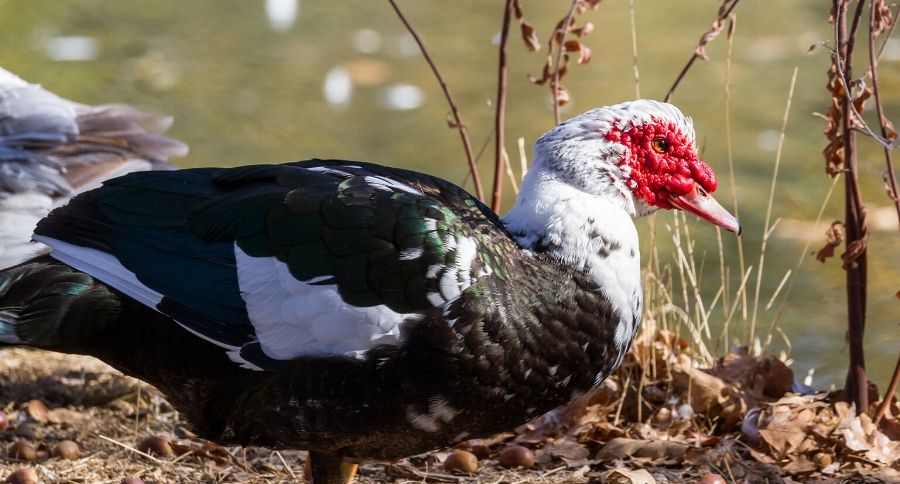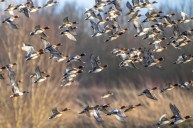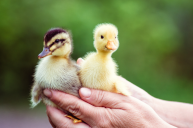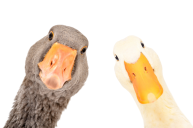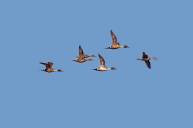Muscovies have a bright red face mask that makes them stand out from other domesticated ducks! Many people are on the "muscovy duck" team and love this breed. They live for 10-12 years.
How about this cool fact? The Spruce Pets tells us that they are also generally silent ducks but have a number of calls and sounds.
"A tropical dabbling duck, the muscovy duck is one of only two species (the other is the mallard) from which all domestic and agricultural duck breeds have descended."
There are many reasons why the muscovy duck is such a popular breed! The blogger at Insteading has five reasons why you should consider muscovies.
- They're bug hunting machines!
- Free-ranging experts
- Less messy than mallard ducks
- Huge eggs in the Spring
- They wag their tails like dogs
Muscovy duck characteristics
https://www.instagram.com/p/B6tm9zUAOUp/
These are large ducks! They can have a wingspan of up to 64 inches. It is also a heavy breed and can weigh up to 15 pounds. The girls are slightly lighter at 6-7 pounds.
What about their unique appearance?
The Happy Chicken Coop tells us:
"The black feathers of the male are iridescent in sunlight but the female coloration is more muted and drab in order to provide camouflage when nest sitting.
The head is very unique. The facial 'mask' will be a dark red/blackish color—the caruncles will grow slowly and the boys will develop them before the girls.
The caruncles are larger and more colorful on the male. The mature male will have a large dark red/blackish knob at the base of his bill."
Housing
These ducks can live with your chickens if that's what you're planning. Generally speaking, domestic ducks move very slowly on the ground and can't fly, so they are extremely vulnerable to predators—especially at night—and need a safe place to sleep and lay their eggs.
Overall behavior
https://www.instagram.com/p/B6cJvnBJxMT/
Domestic muscovy ducks are found to be gregarious and likely to join mixed flocks with other waterfowl in urban areas. How cute is it that they wag their tails like dogs?
Anyone who has backyard ducks loves watching them eat bugs, and I imagine they're even more fun to watch than chickens.
Diet and feeding
https://www.instagram.com/p/B7FEh9fA_Ck/
The blogger at Insteading explains that feeding muscovies is really simple.
"Our small flock feeds itself entirely from our land. We have a pond teeming with larvae, fields full of clover, mice, and bugs, grit in abundance, and worms and slugs after every rainstorm. On the rare days when we travel and I have to keep them cooped up while we're gone, I provide a pan full of whole seeds and a huge bucket full of grass and weeds torn up from the surrounding area."
Sign us up, as this sounds easy!
Having feral populations, wild birds, feral muscovy ducks or wild muscovy ducks in your yard is very different than adopting or raising domestic ducks in your backyard. Do your research before you bring home muscovy ducklings.
Do you want a male muscovy as part of the flock? Research this if you have roosters! Remember that the ducks don't roost as chickens do so your housing needs to suit ducks that will nest on the ground. They won't use nest boxes.
A little history?
"Their native range extends from the extreme southern tip of Texas and both the eastern and western coasts of Mexico south through Central America and into South America as far south as northern Argentina, though they are missing from the steepest mountain regions. Feral and domestic populations may be found nearly anywhere, but are particularly notable in Florida and elsewhere in the United States and Canada, as well as in Europe and New Zealand."
The scientific name for this bird species is Cairina moschata. The muscovy duck is part of the Anatidae bird family, a large and diverse grouping of ducks, geese and swans. Another common name is the mule duck.
If you ever find a lost or wandering duck (or any American bird) you should contact the Fish and Wildlife Service.
They may be quiet but they still have a special quack!
Do you have both chickens and ducks in your flock? Please let us know in the comments!
